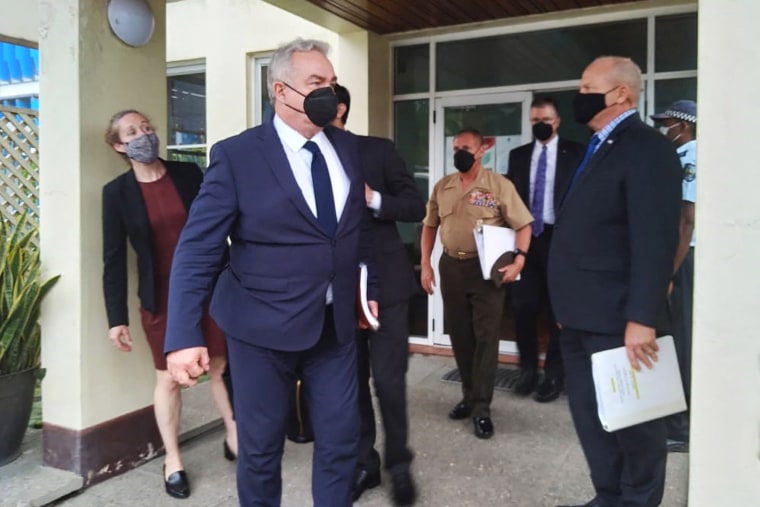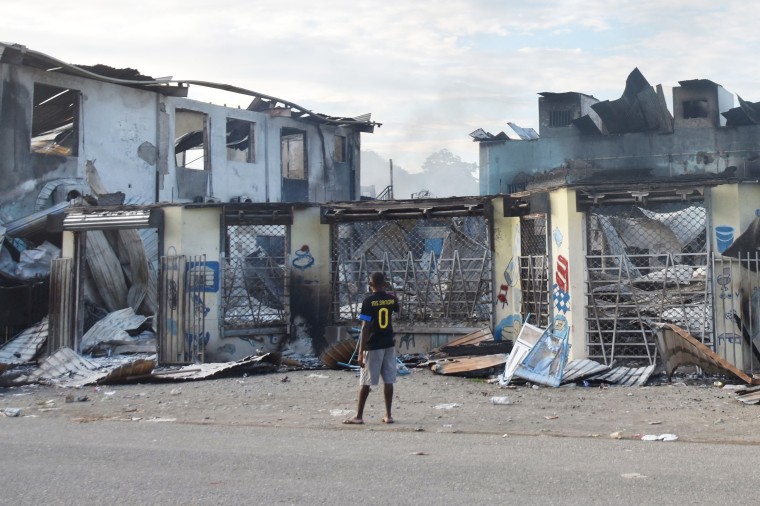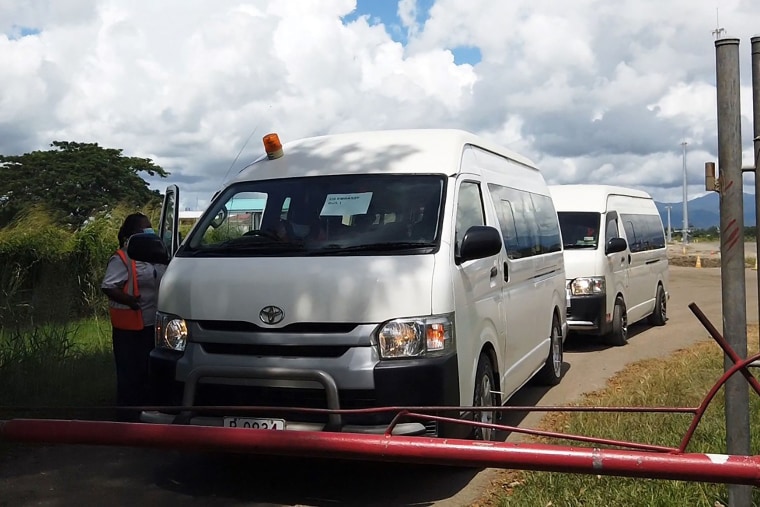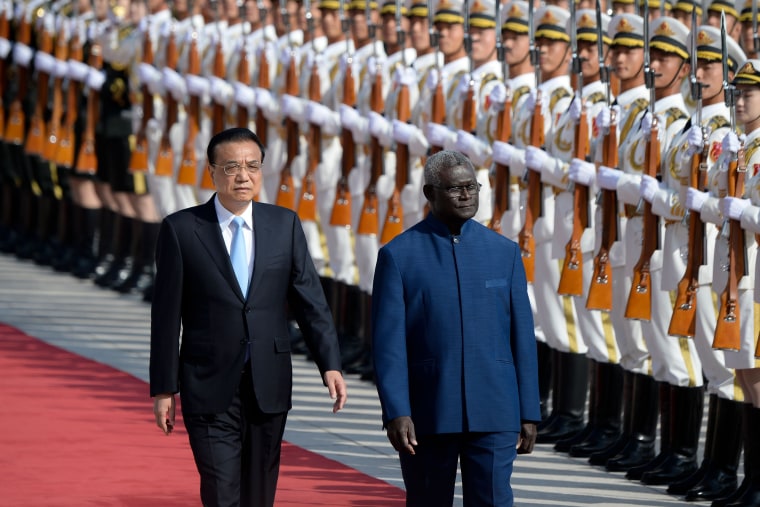CHRISTCHURCH, New Zealand — A tiny island chain in the South Pacific has Western governments scrambling after it agreed to a security pact with China that the United States and its allies fear could enhance Beijing’s military power in this strategically important region.
The deal between China and the Solomon Islands, a nation of 700,000 people that had deadly riots last year, poses “serious risks to a free and open Indo-Pacific,” officials from the U.S., Australia, Japan and New Zealand said in a statement on Wednesday.
Alarm in Washington and other capitals is so high that on Friday the highest-level U.S. delegation in years visited the Solomon Islands. Kurt Campbell, the top White House official for Asia, and Daniel Kritenbrink, the assistant secretary of state for East Asian and Pacific affairs, met with Prime Minister Manasseh Sogavare in Honiara, the capital.
Download the NBC News app for breaking news and politics
Campbell had been expected to warn Sogavare against the deal, the details of which have not been publicly disclosed, but that was pre-empted days before his visit when Beijing and Honiara announced they had already signed it. According to a draft leaked online in March, the deal allows China to send police and armed forces to the Solomon Islands “to assist in maintaining social order” and Chinese warships to make stopovers there.

The deal is a “game changer,” said Anne-Marie Brady, a China expert at the University of Canterbury in New Zealand.
“The U.S. is the main target of this move, as it aims to counter U.S. containment strategy in the Indo-Pacific,” she said. “But it also directly threatens the security and autonomy of the island states of the Pacific, as well as Australia and New Zealand.”
Among their concerns is that the deal could enable China to set up a military base — its first in the Pacific — less than 1,300 miles from Australia, whose relations with Beijing are at their lowest point in years. The Solomon Islands also sit on key shipping lanes between the U.S. and Asia.
Leaders from the small island nations in the Pacific, the site of some of the fiercest battles in World War II, have expressed worries they could once again be drawn into a conflict among major powers. In an open letter last month, Federated States of Micronesia President David W. Panuelo implored Sogavare to consider the “far-reaching and grave security implications” of the China agreement.
At their meeting on Friday, Sogavare assured the U.S. delegation the deal would give China no military base, no long-term presence and no power projection capability, according to a White House statement. The Chinese Foreign Ministry also says the agreement is about maintaining stability in the Solomon Islands and is “not targeted at any third party.”
“Normal law enforcement and security cooperation between China and Solomon Islands, two sovereign and independent countries, is consistent with international law and customary international practice,” ministry spokesman Wang Wenbin said at a news conference last month.
Beijing has accused Washington of promoting a “cold war mentality” in the Indo-Pacific through initiatives such as Aukus, a security partnership with Australia and Britain that the Biden administration announced last year. Even before the China agreement was leaked online, the U.S. said it planned to reopen its embassy in the Solomon Islands for the first time since 1993.
The Solomon Islands has grown closer to China under Sogavare, giving Beijing a major win in 2019 when it severed long-standing diplomatic ties with Taiwan. Unease about China’s role in the country’s affairs, and claims of Beijing-linked corruption, contributed to violent unrest in November that targeted the capital’s Chinatown and left four people dead. Australia sent peacekeeping forces under its own security agreement with the country.

According to Sogavare, the security pact with Beijing is needed in part so Chinese police can protect Chinese-funded infrastructure. But opposition leader Matthew Wale said he feared Sogavare, who has tried to postpone the 2023 general election, could use Chinese forces to prop up his government.
The Solomon Islands Ministry of Foreign Affairs did not reply to an email request for comment.
“The stakes are very high,” Cleo Paskal, a U.S.-based Indo-Pacific analyst, said of the deal.
“The links with China are centered on one individual, Sogavare, and are increasingly unpopular across Solomons. The country is one free and fair election away not just from abrogating the security agreement, but from flipping back to Taiwan,” she said.
“This raises concerns that a ‘security incident’ will happen or be created that is used as a pretext to cancel the elections and invite in P.R.C. security forces,” she added, using the initials for China’s formal name, the People’s Republic of China.
Tarcisius Kabutaulaka, a political scientist at the University of Hawaii who is from the Solomon Islands, said Sogavare’s government would not allow Beijing to build a military installation and was simply seeking to exploit global rivalries.
“The West is really, really anxious” about China’s growing influence in the region, he said, “and it’s playing into the Solomons government’s hands. They’re trying to create a situation where they can leverage the West as well as the P.R.C. to see if the country can gain as much from it as possible.”
While it is likely to have some military presence in the Solomon Islands, Kabutaulaka said, China doesn’t need its own base there.
“If their ships and navy can acquire access to the Solomons, they will not need a permanent physical presence,” he said. “And any military base would cause a lot of debate that could become a political liability” for the governments in both Honiara and Beijing.
Iati Iati, Pacific security fellow at the Center for Strategic Studies at Victoria University of Wellington in New Zealand, told NBC News he doesn’t see “the same level of alarm” among Pacific island nations as in Australia and New Zealand.
Those two countries, which see the Pacific as their backyard, will not influence their neighbors if they “continue to act in a high-handed and condescending manner when issues like this arise,” Iati said.
The Pacific has already been militarized, he said, citing a new U.S. military base being built in Micronesia and upgrades to a naval base in Papua New Guinea being funded by the U.S. and Australia.
“They speak about respecting Pacific Island countries’ sovereignty, but then assert that they know what’s best for these countries’ security needs,” Iati said. “Responses from Australian and New Zealand government circles reek of neo-colonial sentiments that Pacific island countries appear to have grown tired of.”

The reaction to the China-Solomon Islands security agreement has been especially sharp in Australia, where an election campaign is underway. One commentator called it “Australia’s Cuban missile crisis” and said Australian forces should invade the Solomon Islands if necessary to block the deal. An Australian government minister flew to the Solomon Islands this month to try to persuade Sogavare not to move ahead with it.
Kabutaulaka said the way Australia and other countries think about the Pacific has not kept up with reality.
“China is a power that is in the region to stay,” he said. “The challenge for Pacific island nations is to manage both the relationship with China and the Western countries in ways that benefit them and ensure that they are not trampled on.”
